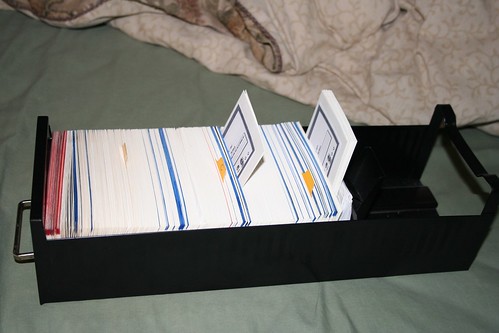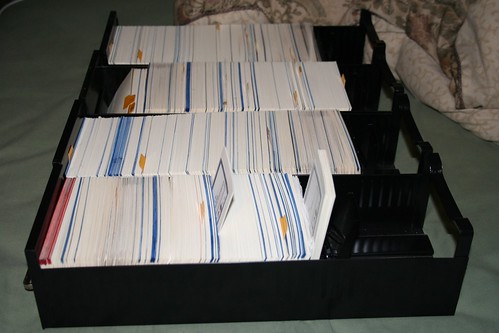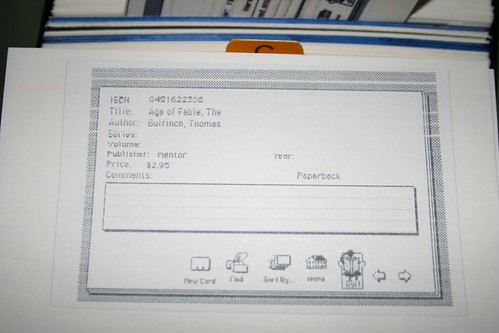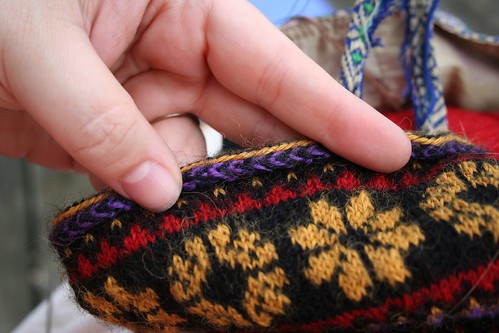As I've mentioned several times, I've been putting my books on LibraryThing, and it is good. This is partly because I'm an anal-retentive freak who already cataloged my books, so all I'm having to do (mostly) is type the ISBNs or other info off the cards I have.

As you can see, it looks like I'm making progress.

At least until I compare all four drawers. To add insult to injury, the A-C drawer is a bit short because everything up to Anderson was either lost or destroyed in a tragic cat pee incident. (Don't ask.)
One issue that I'm having, though, is that I printed out the catalog quite a while ago. As in, over ten years ago, before laser printers were affordable to the likes of me. So...

A close-up of one of the cards, in all its dot-matrix glory.

Another card, in a somewhat more typical state of inkless ribbon glory.
Still, the cards are (mostly) legible, and it's much nicer to read the information off them than have to physically work my way through every book. Too bad, really, that I haven't actually updated the catalog in something like eight or nine years. At the moment, though, I'm enjoying the luxury of being able to do my searches from the comfort of my bedroom, armed with my cards. I'll worry about the un-cataloged books later.
A bit more about the LibraryThing process.
The easiest way to enter a book is to do a search through the numerous online databases that LibraryThing is linked with, including the Library of Congress, the Folger Shakespeare Library (useful for my Marlowe stuff), and various Amazon.coms. This means, of course, that it's most helpful when the specific edition of the specific book you're entering is correctly and thoroughly entered into said database. Since the Amazon results also include those entered by the various affiliated sellers, you can imagine that the accuracy and consistency of the listings can be...erratic.
Still, I'm getting the hang of it. I'm learning how to make the Library of Congress work for me on my older books (you can even search with LC catalog numbers, which is a godsend for books published before ISBNs became the standard), and I've learned that it's more efficient to just set the cards for problem books aside rather than waste time trying to track them down as I go. I've also scanned in quite a few covers for the database, but again I think I'm going to let them accumulate rather than doing them as I come to them.
I did, however, take the time to track down edition and printing information for my Three Investigators collection (which is how I learned about the movie, actually). I'd been actively buying and reading the books since about 1970, and frankly never had a clue about the differences in the various editions, other than the fact that they seemed to change at random (which is actually pretty close to the truth). I was surprised that several of my used hardbacks were, indeed, first printings. I was even more surprised to find out that I was only missing one book, and two clicks later I'd found it for under $10 on Amazon. The internet is an awesome thing.
The big issue for me with this database, like any other, is longevity. One reason I quit maintaining my catalog was that the software I was using--Hypercard--finally became obsolete. I had a hard copy, but to move my books to a new electronic database would entail re-entering the information for all my thousands of books. It's also one reason that I made the card catalog. I knew that it would probably be my only truly lasting record. My hope is that LibraryThing stays around long enough for me to get everything entered and printed and maybe even saved to a nice stable ASCII text file. :)

As you can see, it looks like I'm making progress.

At least until I compare all four drawers. To add insult to injury, the A-C drawer is a bit short because everything up to Anderson was either lost or destroyed in a tragic cat pee incident. (Don't ask.)
One issue that I'm having, though, is that I printed out the catalog quite a while ago. As in, over ten years ago, before laser printers were affordable to the likes of me. So...

A close-up of one of the cards, in all its dot-matrix glory.

Another card, in a somewhat more typical state of inkless ribbon glory.
Still, the cards are (mostly) legible, and it's much nicer to read the information off them than have to physically work my way through every book. Too bad, really, that I haven't actually updated the catalog in something like eight or nine years. At the moment, though, I'm enjoying the luxury of being able to do my searches from the comfort of my bedroom, armed with my cards. I'll worry about the un-cataloged books later.
A bit more about the LibraryThing process.
The easiest way to enter a book is to do a search through the numerous online databases that LibraryThing is linked with, including the Library of Congress, the Folger Shakespeare Library (useful for my Marlowe stuff), and various Amazon.coms. This means, of course, that it's most helpful when the specific edition of the specific book you're entering is correctly and thoroughly entered into said database. Since the Amazon results also include those entered by the various affiliated sellers, you can imagine that the accuracy and consistency of the listings can be...erratic.
Still, I'm getting the hang of it. I'm learning how to make the Library of Congress work for me on my older books (you can even search with LC catalog numbers, which is a godsend for books published before ISBNs became the standard), and I've learned that it's more efficient to just set the cards for problem books aside rather than waste time trying to track them down as I go. I've also scanned in quite a few covers for the database, but again I think I'm going to let them accumulate rather than doing them as I come to them.
I did, however, take the time to track down edition and printing information for my Three Investigators collection (which is how I learned about the movie, actually). I'd been actively buying and reading the books since about 1970, and frankly never had a clue about the differences in the various editions, other than the fact that they seemed to change at random (which is actually pretty close to the truth). I was surprised that several of my used hardbacks were, indeed, first printings. I was even more surprised to find out that I was only missing one book, and two clicks later I'd found it for under $10 on Amazon. The internet is an awesome thing.
The big issue for me with this database, like any other, is longevity. One reason I quit maintaining my catalog was that the software I was using--Hypercard--finally became obsolete. I had a hard copy, but to move my books to a new electronic database would entail re-entering the information for all my thousands of books. It's also one reason that I made the card catalog. I knew that it would probably be my only truly lasting record. My hope is that LibraryThing stays around long enough for me to get everything entered and printed and maybe even saved to a nice stable ASCII text file. :)




